Shared on our social media in January 2017, the documentary video “O Estigma da Depressão Pós-Parto” [“The Stigma of Postpartum Depression”] produced by BBC Brasil provides a moving testimonial of a mother who faced and overcame the problem.
The great impact of this posting, generating various comments and opinions from our followers, made us return to the theme. This time, we decided to hear what medical professionals who work closely with women during pregnancy and after the birth of the baby have to say.
All the experts interviewed were in agreement on stressing the importance of differentiating so-called “baby blues” from postpartum depression. Do you know what the difference is?
Medical specialist in Gynecology and Obstetrics from the Paulista School of Medicine (UNIFESP), Maria Cecília Breim, M.D., explains that “a feeling of sadness that does not qualify as depression is what Americans call ‘baby blues.’ This sadness can affect the vast majority of women in the postpartum period, especially after the birth of the first child. It has to do with hormonal changes, a sudden drop in levels of the hormones estrogen and progesterone, and the new situation of a woman who, suddenly, finds herself a mother.”
“Feeling sad is also a common reaction. Feeling irritable is also a common reaction. Feeling exhausted and not being able to stand hearing the baby crying anymore is also a common reaction. Everyone goes through this”.
Maria Cecília Breim, M.D. – Obstetrician-Gynecologist
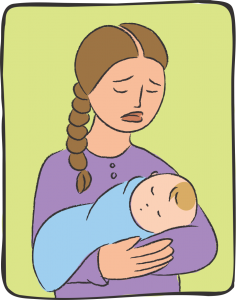
For Francisco Frederico Neto, M.D., a pediatrician from the Pediatric Specialties Clinic of the Sírio-Libanês Hospital and scientific advisor and master teacher of the Instituto Criança é Vida (Child is Life Institute), true postpartum depression is something that happens very rarely. “What occurs very often is the so-called ‘blues’ or maternal sadness, which is a certain state of melancholy, sadness and doubts about competence, felt by close to 70% of women, but it is transitory and usually lasts no more than 3 to 4 weeks after the baby’s birth,” the doctor explains.
Postpartum “blues” is a physiological phenomenon, according to Daniel Klotzel, M.D., an obstetrician-gynecologist who graduated from the Paulista School of Medicine. The doctor says that the feeling of emptiness a woman feels after giving birth, when she no longer carries her baby in perfect harmony within her, and hormonal changes, whose effects usually last some days or weeks, are factors that cause this postpartum sadness.
After arrival of the baby, the woman, now a mother, is caught up in a whirlwind of changes and, thus, it is expected that she will face many difficulties and feel sadness. To the relief of many mothers, the psychologist graduated from the Pontifical Catholic University (PUC) and psychoanalyst member of the Department of Psychoanalysis of the Sedes Sapientiae Institute, Anna Mehoudar says that this should not be a matter of concern or feeling of guilt.
“It seems that motherhood and guilt are inseparable and we need to change this idea a little”.
Anna Mehoudar – Psychologist-Psychoanalyst
Author of the book “Gravidez e cuidados com o bebê: um manual para pais e profissionais” [“Pregnancy and Baby Care: A Handbook for Parents and Professionals”], Sumus publishing house, Anna Mehoudar says that 8 out of 10 women experience so-called postpartum ‘blues’ or maternal sadness. “It would be strange for a woman not to cry together with her baby at some point. She is going to cry and I can only tell this mother that she doesn’t need to worry about this crying because this is the baby’s body language. It is how they communicate,” the psychologist reassures.
According to psychiatrist Tânia Bitancourt, M.D., of the Psychosocial Attention Center II – Adult (CAPS II – Adult), in Embu das Artes, in the São Paulo Metropolitan Area, the idealization of motherhood by society can contribute to a woman not allowing herself to feel sad in the postpartum period. “No one cares about the losses involved in motherhood. Every time there are transformations and changes, there are gains and losses. In this case, there are individual losses, personal time losses, and the loss of a good night’s sleep. Motherhood is a time of great pleasure and joy, but also of big difficulties,” the doctor warns..
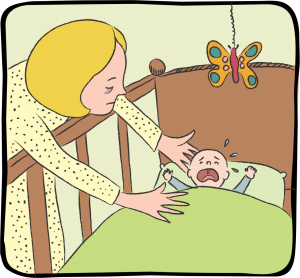
Having worked for more than 30 years in obstetrics, Maria Cecília Breim, M.D., agrees with this statement. “Everyone is astounded by humanized delivery and no one says that postpartum is difficult, that a woman gets little sleeps during this period, breastfeeds every two or three hours and can’t even eat properly sometimes. The focus is very centered on delivery and on the idealized beauty of motherhood, ignoring the fact that this also involves many difficulties. I think people are not prepared for motherhood,” she says.
“A woman is expected, after giving birth, no matter how many times she got pregnant, to feel insecure about caring for her baby that depends only on her, especially with regard to nutrition and affection”
Daniel Klotzel, M.D. – Obstetrician-Gynecologist
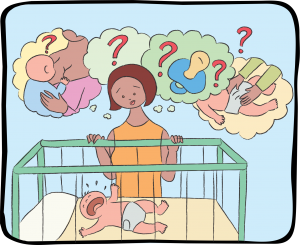
In her private practice, psychiatrist Tânia Bitancourt, who graduated 35 years ago from UNIFESP and completed psychiatry residency at the São Paulo State Public Servant Hospital, is of the opinion that women’s feelings, doubts, and thoughts are not so absurd after all. “It is necessary to understand that, in fact, motherhood produces a tremendous change in life, that the doubts or thoughts a woman herself considers abnormal or unreasonable do not mean she does not want the child or cannot become a good mother,” she adds.
The Ghost of Depression
Different from “baby blues,” a condition expected during motherhood, especially with the first child, in cases of depression there is a more significant behavioral change, according to psychiatrist Tânia Bitancourt. “The person was not like that and now is. The woman feeling herself affected and not feeling well very often ends up asking for help,” says the doctor.
Fear of being alone, fear of her own behavior and her own thoughts, neglect of personal activities such as work and thoughts of suicide are some signs of depression, according to the psychiatrist. “They are situations in which the person is not able to cope with everyday life. Depression does not necessarily begin right after a baby is born. It can happen two or three months later. Thus, the disease presents itself in various ways,” explains the specialist.
Tânia also states that it is not yet possible to identify serious cases. “The person gets unsettled, sleepless, crazy and speaks senseless things. It is a change in behavior that will not go unnoticed,” she explains.
According to obstetrician-gynecologist Maria Cecília Breim, with 35 years of clinical practice, it is possible to determine whether sadness is a change caused by hormonal changes both by investigating how long it lasts and the intensity of the symptoms. “Cases like these, resulting from drops in hormone levels, are in general lighter and do not last long. They are experienced in the first week or first ten days after giving birth and the person then gradually recovers. When it becomes very intense and long-lasting, then it is no longer hormonal and there is some other element involved and that has to be investigated,” she warns.
Postpartum depression affects 15% of women worldwide and a third of mothers who use São Paulo’s public health system, according to a survey conducted by the Psychology Institute of the University of São Paulo (USP).
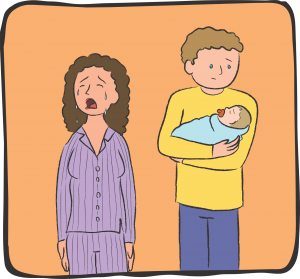
Women already suffering from depressive conditions and undergoing long-term treatment should assess together with their doctors, whether medication should continue or be stopped during pregnancy. The decision will depend on the conduct of each professional and on the patient’s choice. “In my practice, I usually stop medication in the first three months of pregnancy, when the embryo is forming,” says Tânia Bitancourt.
Postpartum depression cases are, thus, cases considered serious, which require medical attention and psychiatric medication, in addition to the involvement of another adult who is responsible for caring for the baby while the mother recovers.
Possible Causes
Psychiatrist Tânia Bitancourt says that every mental disorder has a multifactorial cause. “You have a variety of genetic situations, together with environmental situations, with social economic factors, and with psychological stress. A little of all this is enough for the disease to appear. There is not just one cause,” she explains.
Excessive demands from the child, husband, the house to be straightened up, the body that is no longer the same are factors that can also contribute to the development of postpartum depression, according to psychologist Anna Mehoudar. “All these factors, as well as the woman’s own life story, are needed for depression to occur. If she becomes aware of all these things, postpartum depression tends to become less important,” she says.
Daniel Klotzel, M.D., an obstetrician used to assisting women from pregnancy through postpartum, also calls attention to situations that can trigger depression, regardless of each person’s predisposition. “Women who feel overwhelmed, with breastfeeding difficulties, insecure, lonely, neglected or with the husband and family not helping much, in addition to financial or professional difficulties, should receive greater attention from health professionals starting in the prenatal phase. a.
Reception vs. Solitude
In a video published on his Facebook page, pediatrician Daniel Becker stresses the importance of raising the issue of isolation faced by contemporary urban women during the postpartum period. In light of the absence of the so-called support network usually made up of family members and friends, the doctor recalls a statement that is a symbol of the level of demand a baby can represent: “It takes a village to care for a child.” You can watch the complete video on Integral Pediatrician.
For psychologist Anna Mehoudar, a general impoverishment of oral transmission in all social classes partly explains the phenomenon of isolation. “A woman leaves home quickly, goes to work, goes to study and ends up not having time to socialize with other women in the same situation. The husband is working, the mother lives in another city, and friends work. She has no support network. And a woman cannot go through the postpartum period alone. She needs a support network,” she warns.
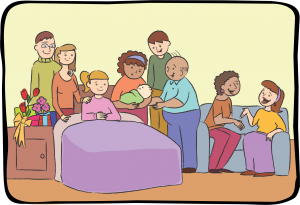
Obstetrician-gynecologist Maria Cecília Breim, M.D., agrees that motherhood can be a very lonely experience, especially if a woman does not have a lot of family support. “Today almost all grandmothers work and are unable to give the attention provided in the past, when mothers cared for daughters who were going to give birth. People have to find their own way,” she adds.
To end this isolation, health professionals play an essential role. Obstetrician and pediatrician clinics or shift breastfeeding conducted by nurses can be important places for women both to get their questions answered and share their feelings.
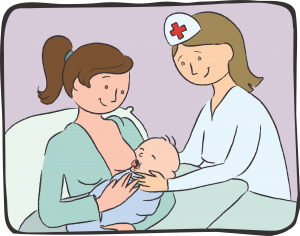
Psychologist-psychoanalyst Anna Mehoudar believes that “her most important function as a professional is to strengthen what she is doing correctly.” For her, it is very important to know how to deal with pediatricians during postpartum. “There is the need to strengthen women’s empowerment, encourage them to ask for help and legitimate the fact that they are going to make mistakes, but also have the opportunity to do the right things,” she says.
An obstetrician-gynecologist since1980, Daniel Klotzel, M.D., believes that every medical check-up, whether it be prenatal or postpartum, should involve a lot of conversation.“ We talk about everything. From physical sensations to feelings. From food to family, husband and eventually children and work relationships. Addressing feelings is very important,” he tells us.
According to the doctor, during the prenatal period it is already possible to identify issues that can concern a woman in the future and be aware of these possible demands during the postpartum period. Among them are insecurity about how to care for the baby, difficulties in managing household tasks, lack of help and even the presence of older people who can both help or hinder.
For psychiatrist Tânia Bitancourt “in lighter cases of depression, in which the mother herself hides the symptoms, it is important that health professionals be able to identify and handle the problem.” The doctor believes that in the assistance offered by Basic Health Units (UBS), giving advice about breastfeeding and baby care, a kind of routine approach should be developed, so that women can have a chance to talk about postpartum depression.
In addition to these places, Daniel Klotzel, M.D., recommends groups of pregnant women and couples who prepare for delivery as environments in which a woman, and also a man, can ask questions, and discuss their doubts and problems during pregnancy.
According to Daniel, in the case of men, there are usually issues related to the social responsibility of playing the man’s role as provider. “We talk a lot about depression and melancholy during female postpartum, but men also have problems, although of different kinds,” the specialist says.
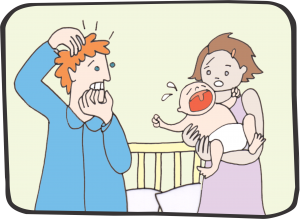
The gynecologist says that “both men and women can feel bad as early as the beginning of pregnancy.” It is the so-called “ambivalence of the first quarter of the year” when, even with a planned pregnancy, doubts arise about the future, about competence in dealing with motherhood and fatherhood, fear of losing sexual relationship and transforming the couple’s life into that of a father and mother taking care of a baby.
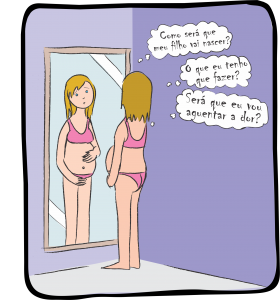
The feeling of being abandoned and the woman’s lack of interest in them after motherhood are men’s common complaints, according to psychanalyst Anna Mehoudar. According to her, the tip for couples to get through this time together is to understand that, just as motherhood and fatherhood are new situations for both, “return to a sex life also involves building a sex life together – it is as if you start dating again, a new marriage,” she says.
